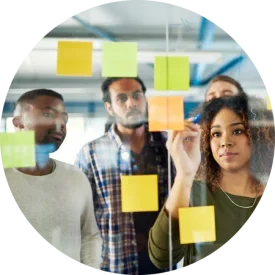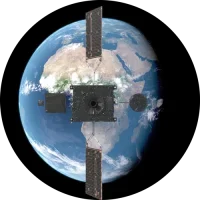OPPORTUNITIES
become one of our teams
Integrate diverse data and knowledge to accelerate insights for climate action.
We invite proposals for teams comprising a mix of members from research, policy and practice, with no requirement to be affiliated with the University of Cape Town. ASCEND provides funding for meeting and travel expenses, along with team facilitation, data science support, and support for a dedicated postdoctoral researcher for each team.
View our current opportunities, and frequently asked questions, below.
Stay informed about upcoming opportunities by subscribing to the ASCEND mailing list.



Current Opportunities
Deadline: 25 July 2024
This Request for Proposals invites potential team leaders to propose an opportunity for a transdisciplinary team to use synthesis research approaches to produce actionable research for reducing risks from climate change in Africa. Actionable research goes beyond understanding a problem to being solutions-oriented—that is asking “what can be done?”— and informing policy and/or practice. It is expected that the synthesis research will include data and knowledge on Africa but this may also involve synthesis of data and knowledge beyond Africa that has relevance for the continent, such as on global climate finance flows or case studies in other contexts of relevance for Africa.
We are looking for up to 6 teams that will convene multiple times at ASCEND in Cape Town, and conduct their work over 2 years. A full-time postdoctoral research fellow is funded for each team. Teams are expected to start in the last quarter of 2024.
Ready to apply? Read our full 2024 Request for Proposals and complete the following:
- Download our full 2024 Request for Proposals [English | French]
- Register for the Online Application Portal
- Download our Proposal Template [English | French]
- Download our Team Participants Table [English | French]
- Download and complete our Data Sources Table [English | French]
- Download and complete our Work Plan table [English | French]
Watch our webinar for more information or download the slides.
Deadline: 17 June 2024
ASCEND aims to accelerate discoveries for more rapid, equitable, and sustained action on climate change and development for vulnerable people and places. The Deputy Director of Team Science is a senior leadership position in ASCEND.
If you have initiative and ambition to enable research for improved climate action, have excellent management skills, and a PhD in a relevant discipline, then this is a great opportunity to join our growing team based at University of Cape Town.
The role will include:
- Leading the implementation of ASCEND strategy
- Designing the calls for ASCEND teams
- Mentorship of Postdoctoral Research Fellows
- Developing and disseminating learning from transdisciplinary practices of ASCEND
- Managing hosting and facilitation support for ASCEND teams
- Leading on the evaluation process of ASCEND
For further information and application details, please click here
Frequently Asked Questions
Synthesis research includes integrating existing data or knowledge from different sources to answer a question or questions that will support climate and development policy and/or practice. Synthesis typically integrates across multiple disciplines, and transcends academic boundaries to include associated knowledge from policy or practice. Research can be focused on any geographical scale, but if your research includes very localised synthesis (e.g., a focus on a specific city or locality as opposed to a synthesis across many cities or localities or cases) then the research should be relevant by being able to inform research, policy and/or practice in other contexts more generally.
Examples of synthesis research include, but are not restricted to: (i) combining data from many independent research projects or data sources to produce insights across different contexts; (ii) integration of diverse quantitative and/or qualitative data such as multiple case studies, government datasets, satellite data, climate model data, commercial data or other data and knowledge types to undertake a novel analysis; (iii) convening experts from different backgrounds to address a question through expert elicitation, delphi processes, or other approaches; (iv) conceptual synthesis of different theories or frameworks, or integration of different existing methods or models (e.g., integration of different approaches to vulnerability assessment); (v) extracting and processing data from reports and research articles or other sources such as social media or remote sensing to generate large, newly integrated datasets and analysing the resulting data to produce new insights or evidence; (vi) using machine learning to assist with synthesis of large datasets; (vii) large systematic reviews, evidence mapping, or meta-analyses that combine statistical results from multiple separate studies. Teams might often propose to adopt multiple approaches to generating synthesis results, such as integrating diverse quantitative data coupled with synthesis of qualitative frameworks. Proposals should provide evidence that sufficient data and appropriate analytical tools are available or will be developed to tackle the research questions. This synthesis of existing data may often require substantial data processing (e.g., for cleaning climate impacts data, or aggregating social survey data) and can often lead to the development of new, integrated datasets or knowledge frameworks as important research products. Our requests for proposals will not support new data collection using fieldwork or laboratory experiments.
The defining characteristic of actionable research is that it is solution-oriented. It goes beyond understanding an environmental or social problem, or the bounds of a narrow academic debate, and launches us into the challenging realm of what can be done, how and by whom. This may require a change in mindset for many researchers – an expansion of thinking into the messier (and often more exciting) issues associated with decision-making, public discourse, and on-the-ground practice. Actionable research is for those who want their work to make a difference in the larger world. Such research typically requires expertise from multiple disciplines and often requires thinking about social and environmental systems because it is rare for a single discipline or perspective to have the answer to a real-world problem. Actionable research also typically requires that we listen to evidence needs, bring together diverse types of knowledge and experience and work with experts and decision-makers outside the world of academia to co-produce research that can improve policy and practice outcomes.
Synthesis teams are typically composed of 5–15 participants from a range of backgrounds, disciplines, sectors, career stages, and institutions. By integrating diverse perspectives and data sources, synthesis teams can discover gaps in knowledge and reveal new insights. The synthesis team model is designed to accelerate discovery and increase the impact collaborative research can have on decisions and actions to enable people and nature to thrive.
Marginalised groups represent people who have been systematically or historically excluded from participation or influence in society and/or who frequently experience exclusion from exercising rights and freedoms. Economically, socially or politically marginalised groups – including but not limited to women, young and elderly people, children, Indigenous Peoples, people with disabilities, people living in informal settlements, marginalised ethnic groups, migrants and displaced people – are often more vulnerable and worse-affected by climate change, and lack the opportunity to use their agency and voice in planning and implementation processes. For this reason, we ask teams to articulate how they will meaningfully integrate equity and social inclusion considerations into their research. Advancing inclusion can improve the terms on which individuals and groups take part in social, political, economic and environmental development processes.
Researchers, policymakers and practitioners of any nationality. ASCEND synthesis teams must have two co-leads who are African or from Africa-based institutions. Africa-based institutions include institutions with head offices in the global North but with the members participating in the BAOBAB synthesis team based in offices in Africa. Citizens of an African country based at institutions outside Africa are eligible as team co-leads and as other team members.
Your team should include a transdisciplinary mix of up to 15 individual experts. This group should include researchers, policymakers and/or practitioners from a relevant mix of sectors and institutions; some strategy or application experts who can facilitate the translation and integration of knowledge across disciplines; and individuals with strong connections to the target audience (decision-makers and other related stakeholder groups), who can help the group maintain a clear focus on those communities’ needs and expectations.
Members should work together from the beginning of the project to design and co-produce its knowledge products. Gaining strong participation commitments from the outset will help maximise project success, since the group’s proposal and first meeting will set the project research questions and a clear plan for all remaining work.
Synthesis team proposals are encouraged to include a letter of support from one or more policy or practice organisations whose staff may participate in the synthesis team, stating why the synthesis team’s efforts are important and outlining how they intend to apply the results.
This call does not support new primary data collection using fieldwork or from laboratory work. The focus for this call is the synthesis of data and knowledge from existing sources.
Successful synthesis team proposals will be funded for up to 24 months to support team travel, accommodation, and per diem expenses for 3–4 in-person meetings of 5–15 experts at ASCEND, for up to 5 days per meeting. Teams will also receive funding for a full-time Postdoctoral Research Fellow based at ASCEND for up to 3 years. Funds are managed by ASCEND and cannot be used to cover salaries of team leaders or team members other than the full-time Postdoctoral Research Fellow based at ASCEND. Funding may be made available for the Postdoc to visit synthesis team leads at their home institutions.
No, the proposal does not require a budget.
Teams will receive funding for a full-time Postdoctoral Research Fellow based at ASCEND for up to 3 years. The Postdoctoral Research Fellow will be a full participant in the team. You do not have to list a person in the role of the Postdoctoral Research Fellow funded by ASCEND at this application stage. You may indicate a team member who could be suitable for this role, but when a team is selected, ASCEND will work with the team co-leads to identify the specific requirements for the Postdoctoral Research Fellow position, and then advertise for and hire the Postdoctoral Research Fellow according to University of Cape Town processes. There will be an emphasis on recruiting early career African scholars for these Postdoctoral Research Fellow positions. Funding may be made available for the Postdoc to visit synthesis team leads at their home institutions.
ASCEND is interested in proposals from teams with a focus on one or more of the following: climate change impacts and risks, adaptation, support for climate action (e.g., finance, technology, governance, and other forms of support), enhancing low carbon, sustainable development. Teams should clearly articulate how their research connects to improving policy or practice to reduce climate impacts and risks or enhancing low carbon, sustainable development.